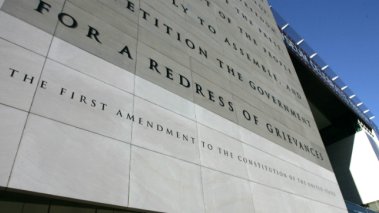Table of Contents
Law review article: Just how exceptional is the First Amendment?

The numerous cases striking down college speech codes stand as a testament to a robust First Amendment. Courts have vigorously enforced the First Amendment against universities that censor students and professors, and its constitutional protections are generally advanced as evidence that Americans have stronger speech protections than anywhere else in the world. But exactly how unparalleled is the First Amendment? In her piece “Forget About It? Harmonizing European and American Protections for Privacy, Free Speech, and Due Process,” Dawn Nunziato, the William Wallace Kirkpatrick Research Professor at George Washington University Law School, argues that the First Amendment may not be that radical after all.
Nunziato disputes a point most free speech experts take for granted: that there is a vast sea of difference between American and European conceptions of free speech. She says that’s not true, and cites, for example, the “right to be forgotten,” a European Union law requiring that online search engines like Google remove search results for an individual that are “inadequate, irrelevant or no longer relevant, or excessive in relation to the purposes . . . of the search engine” upon request by that individual. This statutory right lies at the heart of the conflict between free speech and privacy — while the former entails the free flow of information, the latter necessarily restricts this flow. Since the Court of Justice of the European Union held that this right is enforceable against online search engines in May 2014, Google has complied with approximately 40 percent of all requests and removed over 500,000 URLs.
You don’t have to be a First Amendment lawyer to see how forcing Google to sanitize search results can impact free speech, which is why many constitutional law experts believe such a law would never pass legal muster in the United States.
According to Nunziato, these commentators are right — but for the wrong reasons. She argues that the substantive law of the First Amendment is actually consistent with the right to be forgotten. This is because “[t]he First Amendment does not grant the public an absolute right of access to information about other private individuals on matters that are not of public importance.” The right to receive information guaranteed by the free speech and free press clauses does not include non-newsworthy content “embod[ing] harmful, offensive, or embarrassing information.”
This may strike many as absurd. How can a law requiring companies to censor truthful yet damaging information pass constitutional muster? Nunziato asserts that, in the United States, it already has. She cites the civil wrong, or tort, known as “the public disclosure of private fact,” which imposes liability for exposing information that “(a) would be highly offensive to a reasonable person and (b) is not of legitimate concern to the public.”
When Nunziato compares this tort to the right to be forgotten, the similarities are striking. Despite their vastly different origins in legal systems thousands of miles away, the same types of information are covered under both standards. Humiliating accounts of botched medical treatments, diseases, criminal and civil trials, and sexuality have been the subject of both successful lawsuits for the public disclosure of private fact and accepted requests under the right to be forgotten. This suggests that the intersection between free speech and privacy in the United States and Europe may not be so far apart.
However, the parallels end where the process begins. In the United States, before the government deprives one’s right to free speech, the accused must be afforded due process. Quoting Henry Monaghan, the Harlan Fiske Stone Professor of Constitutional Law at Columbia Law School, Nunziato explains how “procedural guarantees play an equally large role in protecting freedom of speech; indeed, they assume an importance fully as great as the validity of the substantive rule of law to be applied.” In other words, when it comes to protecting free speech, providing fair procedures is just as important as legal protections against censorship.
Yet conversely, in Europe, the right to be forgotten may be exercised without even providing the content provider with notice of its effect. Upon request from aggrieved individuals, Google can simply delete the offending links and leave online newspapers, political advocacy sites, and online encyclopedias wondering why links on their webpages don’t show up as search results.
This leads to Nunziato’s conclusion on whether the right to be forgotten can be harmonized with United States law: The tension between the First Amendment and the right to be forgotten is rooted not in terms of privacy and free speech, but in the utter lack of due process for the affected parties. Without giving “forgotten” website owners notice and an opportunity to be heard by an impartial tribunal — fundamental aspects of due process shared by both American and European legal systems — the exercise of this right would be “radically deficient” and unconstitutional in the United States.
At FIRE, we’ve seen first-hand the importance of due process to the protection of free speech, which is why we defend both principles with equal rigor. Those interested how these principles interact in the United States and across the pond should give Nunziato’s thoughtful piece a read. But regardless of how exceptional the First Amendment may be, FIRE will continue to advocate for due process and free speech as the rule, not the exception, in higher education.
Recent Articles
FIRE’s award-winning Newsdesk covers the free speech news you need to stay informed.

VICTORY: Michigan town declares Sept. 6 ‘First Amendment Day’ after FIRE sues its mayor for shouting down residents

USC canceling valedictorian’s commencement speech looks like calculated censorship

Back into the FIRE: Hasen’s response to FIRE and Rohde: Don’t read the press clause out of the Constitution — First Amendment News 420
